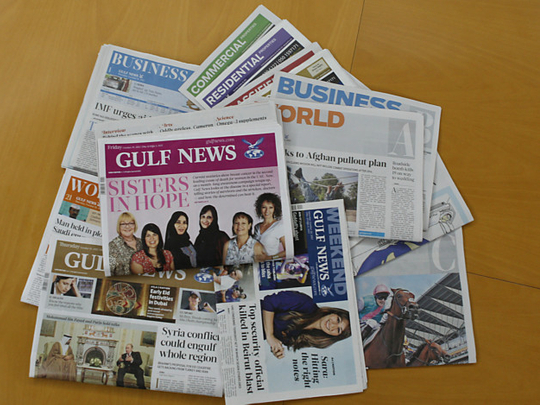
Dubai: There is a lot to be said for brands keeping it simple to stay connected with users. Two local brands, including Gulf News, figure in the Top 10 rankings dominated by international labels in an independent poll for the Middle East version of the ‘2012 Global Brand Simplicity Index’.
This is the third year that the survey — which tries to find a connect between a straightforward brand message and the benefits that this offers — has been held.
Google took the top regional spot in the rankings finalised by the brand consultancy Siegel+Gale — part of the Omnicom Group, the largest US ad agency — and followed by Samsung, MacDonald’s and Gulf News (which has moved up from sixth in 2011). Blackberry was placed fifth, ahead of Yahoo!, Dell and YouTube. The supermarket operator Spinney’s — the other local brand — was placed ninth and pushing Toshiba to the 10th spot. Etisalat and Dubai Metro find spots just outside of the Top 10, while Emirates came in at the 24th position.
Based on the findings, the survey by Siegel+Gale has this takeaway for brands trying to get a lock on consumer awareness: “Depending on the industry, up to 57 per cent of people are willing to pay more for simpler experiences and interactions. The amount they are willing to pay varies by industry but is significant.”
Talking specifically about etisalat, which moved up more than 60 spots this year to the 13th rank, the Siegel+Gale report notes: “With a new chairman and new strategy, the brand has gained a solid reputation across the region, especially among expats. Etisalat also recently launched new services — such as 4G in the UAE — and benefited from a lengthy promotion that offered free data roaming among Egypt, Saudi Arabia and the UAE.”
Industry observers say that the shift to digital interactions with consumers places more responsibility on brands to create less complex messages. “Local brands have an advantage because consumers enjoy interacting with homegrown success stories, especially those that offer a simplistic service based upon local insights,” said Wael Abdul Hadi, digital director at the marketing consultancy Cheil.
“It’s because they have a personal affiliation with that brand and feel proud to be part of the same society — especially if it has nurtured a relationship by maintaining and rewarding conversations, whether that interaction happens in-store at home or online.”
“Digital has changed how that global brand is perceived locally and the brand management must happen at a local level if it is to compete.”
This is the crux of the simplicity debate. Consumer interaction can no longer be confined to the shop floor or wherever the exposure takes place. Online platforms have led to a seamless 24x7 interaction between brands and their followers. If worked right, it can help the brand stay connected even when faced with internal issues. Take Blackberry’s case in the Middle East.
While the smartphone major is grappling with how to get back into the game, in the region, “its phones are marketed as social devices. This strategy appears to have paid off: With increased awareness and the perception that BlackBerry provides a simpler product, the brand earned a No 5 finish in this year’s Middle East Simplicity Index,” according to the Siegel+Gale report. “Respondents consistently cite BlackBerry’s ease of use and the ability to connect using BlackBerry Messenger in support of its ranking.”
And that is a message Middle East cutting across industries can take in. “It is high time these brands create solutions and experiences that make sense for people who live here,” said Janine Bensouda, president at the branding firm Bensouda Consultancy. “This means trend-setting as opposed to following.
“Companies need to remember that brands are transparent. They reflect to the outside world what organisations often think they are hiding on the inside. The complicated state of the inside is equally reflected on the brand, on the outside.”











